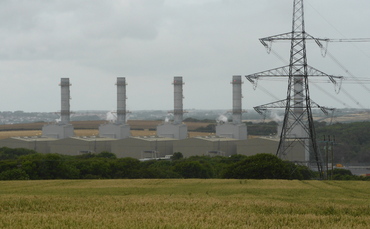

German energy giant inks deal with carbon capture specialist Fluor to explore means of decarbonising 2.2GW gas plant
RWE has inked a deal with carbon capture specialist Fluor to explore the potential of transformation of its 2.2GW gas-fired power station in Southwest Wales into a power generation, CCUS and hydrogen production hub, it announced today.
The German energy giant is set to undertake a six-month study alongside Fluor that will look at the feasibility of retrofitting Pembroke Power Station - the largest gas-fired power plant in Europe - with post-combustion carbon capture utilisation and storage technology (CCUS).
The study is expected to inform RWE's development of potential low carbon solutions for its fossil fuel energy generation assets, with the company committed to decarbonising its UK business by 2040.
RWE said it was developing options for decarbonising the power plant, including the potential of utilising CCUS technology alongside the production of low carbon hydrogen, arguing the site is ideally located for collaboration opportunities with other heavy industrial firms in the area.
The energy firm is eyeing up the potential of the Pembroke Power Station forming part of the wider South Wales Industrial Cluster, which encompasses firms and opportunities across the full low carbon value chain including capture, shipping and storage of CO2 alongside hydrogen production.
As such, the study - which is set to report back early next year - forms part of RWE's plan to participate in the government's CCUS cluster sequencing process that aims to have a minimum of two industrial clusters up and running by the mid-2020s, rising to four by the end of the decade.
"Kicking off this technical feasibility study with Fluor is an important step towards creating tangible options for our lighthouse decarbonisation project at Pembroke," said Julian Marschewski from RWE Generation's strategic development department. "The experience gained will also give us a better understanding on how to decarbonise RWE's wider fleet of gas-fired assets."
The project is being led by RWE's Pembroke Net Zero Centre (PNZC) which, launched earlier this year, brings together the firm's expertise across its offshore wind, gas-fired generation and hydrogen businesses "to develop green energy solutions" across the South Wales region.
Overall, RWE is aiming to invest £15bn in the UK green energy projects by the end of the decade.
Earlier this week, meanwhile, the firm also struck a deal with the Germany government to bring forward its plans to phase-out coal-fired power generation ion Germany by 2030.
Richard Little, director of RWE's Pembroke Net Zero Centre, said the company was committed to decarbonising its UK business by 2040, which he said "fits nicely alongside the government's ambition for a net zero power sector by 2035".
"Through our PNZC we will create a hub for our green energy projects, including the development of floating wind in the Celtic Sea, the development of a hydrogen electrolyser and decarbonisation of Pembroke Power station through a mixture of carbon capture and hydrogen fuel," he explained. "We are already working with South Wales businesses to help them meet their decarbonisation targets, while supporting Welsh Government achieve its ambitions for net zero."
* This article was originally published here
Comments
Post a Comment